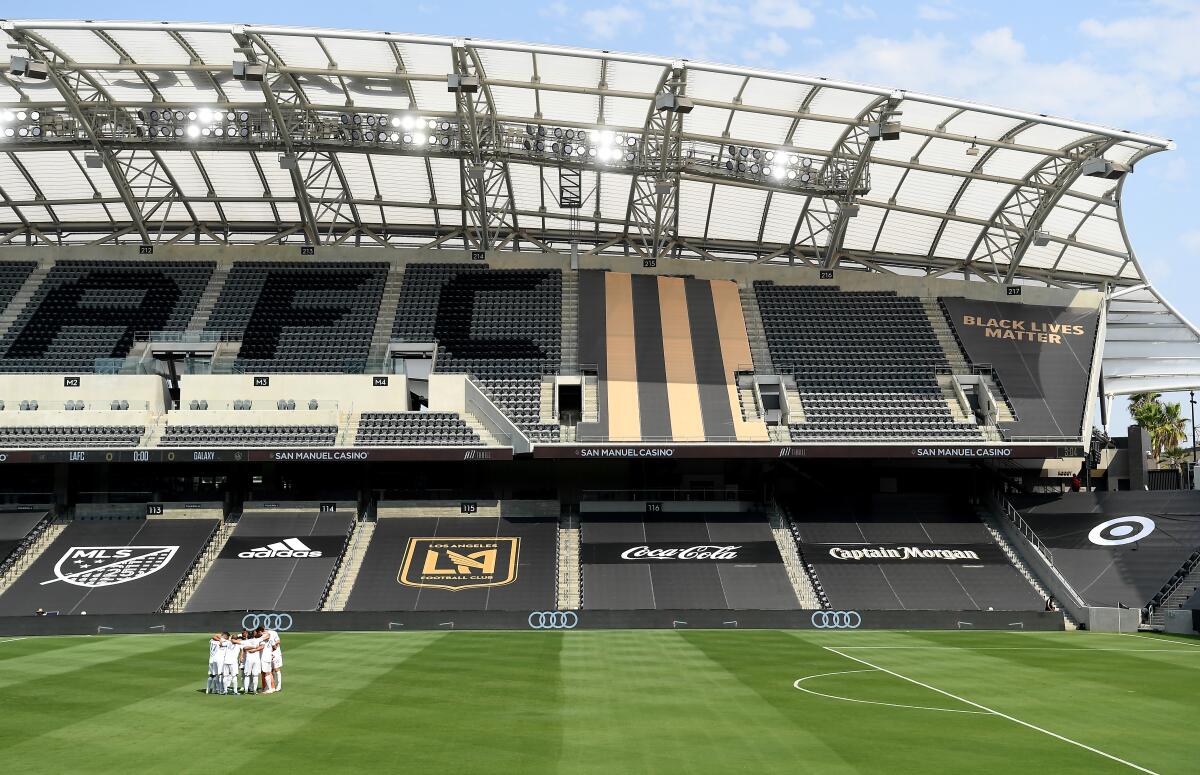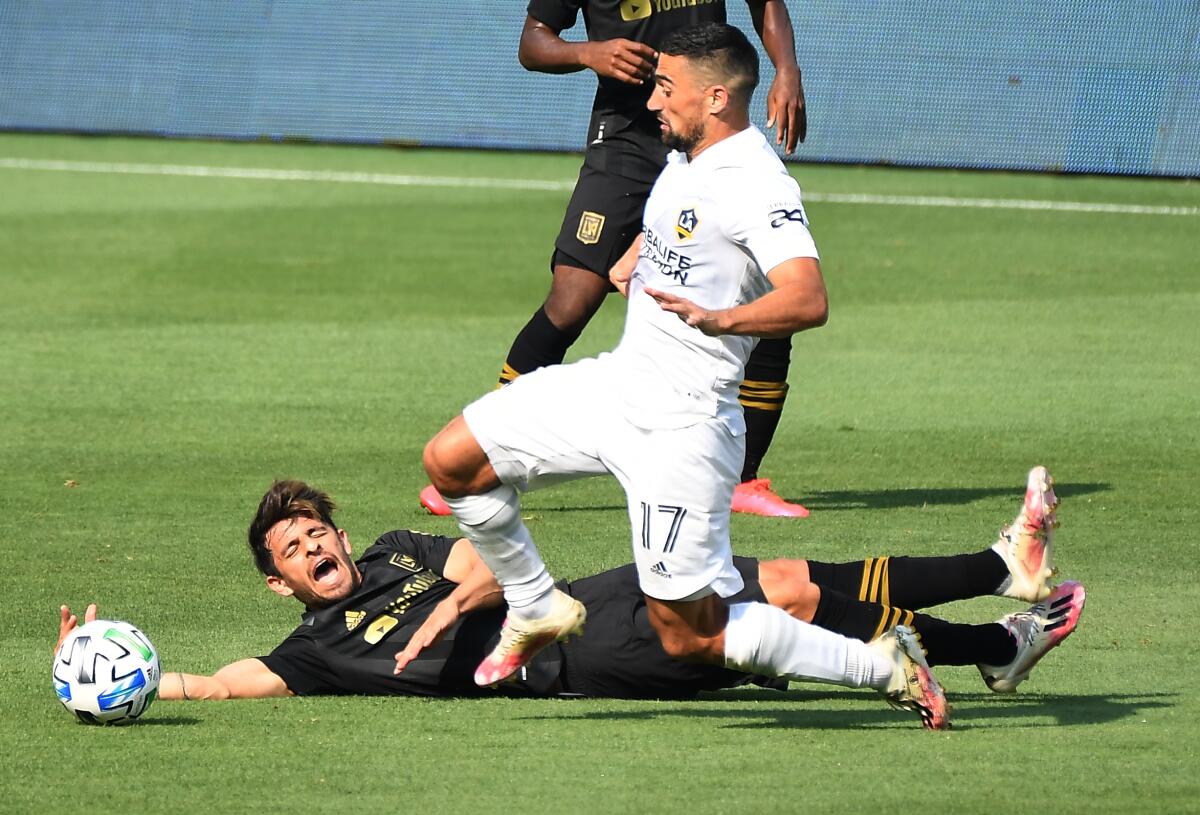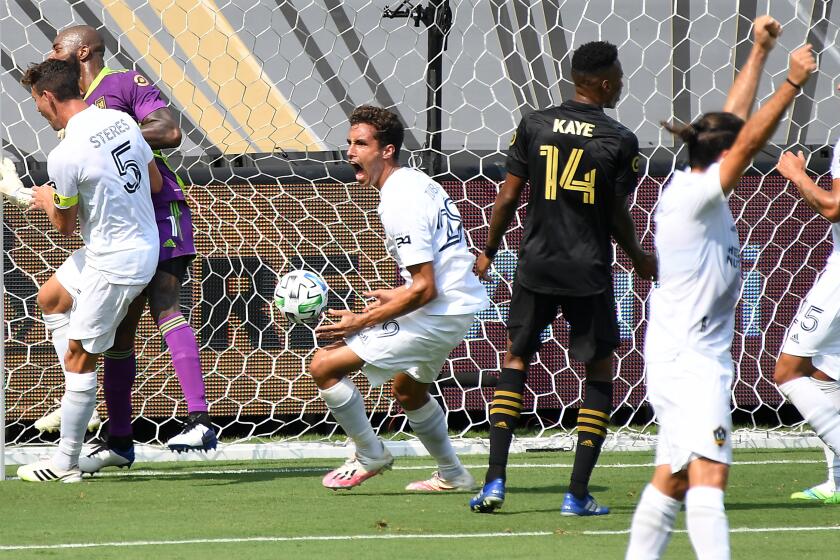Column: MLS, TV should take heat for making Galaxy and LAFC play in extreme weather

- Share via
If only there was something to indicate this was a bad idea.
Like a thermometer.
Heat wave be damned, Major League Soccer insisted its signature rivalry game start at 3 p.m. on Saturday.
The decision protected an important date with a national television audience, but at what cost?
Never mind the result, a 2-0 upset victory for the Galaxy over LAFC.
Played in shoe-sole-melting conditions at Banc of California Stadium, the game was predictably unwatchable.
And now, the best player in the league is down.
LAFC forward Carlos Vela was substituted in the 58th minute with what coach Bob Bradley suspected could be a “MCL-type situation.”
Vela attempted a shot in the 56th minute. The next time his team had the ball, he received a pass on the right flank from Latif Blessing, only to quickly pull up and reach for his left knee.
“We’ll need at least a day or two to fully assess,” Bradley said.
Whether the game conditions played a factor in Vela’s injury is unknown, but it certainly didn’t help.
Vela, who was the league’s MVP and leading scorer last year, skipped the MLS Is Back Tournament in Orlando because of concerns over the novel coronavirus outbreak. Vela’s wife is pregnant. The game Saturday was Vela’s first in more than five months.
At kickoff, the temperature in Los Angeles was 93 degrees. Not the ideal conditions for an expanding league to showcase its improved product.
The Galaxy dominated rival LAFC 2-0 in an empty Banc of California Stadium. LAFC star Carlos Vela left with what appeared to be a serious knee injury.
Describing LAFC’s performance as “terrible,” Bradley refused to blame the result on the heat.
“We have to take responsibility for that,” Bradley said.
And the Galaxy did what they had to do, offering its opponents little space between their back and midfield lines. The visitors went ahead in the 26th minute when Ethan Zubak nodded in a cross by Julian Araujo off a short corner. The Galaxy doubled their lead in the 54th minute when Araujo, who played as a right winger, delivered a cross that was redirected into the net by Sebastian Lletget.
However, Bradley acknowledged that LAFC was concerned enough about the game conditions to ask MLS to push back the start time. But the game was scheduled to be televised by Fox. The request was denied.
Bradley said he didn’t feel “that an afternoon kickoff in weather like this creates a good opportunity for both teams to play an exciting game, to play a game that has tempo, to play a game where we see two teams really going after each other.”
His intuition was right.

When the two teams faced each other last month in Orlando, LAFC dismantled the Galaxy 6-2.
And that was without Vela.
“It’s a day where I’m going to take responsibility because we didn’t look like ourselves,” Bradley said. “We never found any rhythm. The game had no tempo. We weren’t dangerous and we just looked like we were second-best throughout the day. Throughout our history, we’ve always had a way to push games, play a certain kind of football and today we didn’t come close. We had so few guys that played in the way that they normally play.”
As much as Bradley and his players tried to separate their shortcomings from the weather, the reality was most of their problems pertained to their lack of movement or activity — the kinds of things that can be affected when the field is as hot as the outer circles of Dante’s Inferno.
“We’ve been training in the heat for a little bit now, so we should be decently used to the temperature by now, especially since we’re at home,” LAFC defender Tristan Blackmon said. “But I do think it played a factor and you could see that we weren’t moving as we normally would.”
Billy Gazonas was college player of the year when he led Hartwick to an NCAA title, but he also helped soccer rise to the national spotlight.
In any sport, television is a consideration. But leagues often encounter trouble when they prioritize something over the quality of their product. This especially has been the case with MLS, which, in its 25th season, and continues to deal with questions about its legitimacy.
Fox should be mindful of this too. As a broadcasting partner, it has a stake in the league’s success. After “El Trafico,” the network aired boxing matches that were taking place down the street. Why not swap their times? The boxing show was staged indoors. Fans weren’t allowed in the Microsoft Theater, so it’s not as if there were customers who would have been inconvenienced.
MLS and Fox had to know the consequences of a 3 p.m. start. They saw the effects of heat in the MLS is Back Tournament, where the games played mid-morning were considerably worse than the ones played at night.
And look what happened.
What should have been a showcase event for MLS instead became another example detractors could cite when explaining why they don’t follow the league.
Vela’s absence will affect the quality of future games.
LAFC isn’t the only one who lost Saturday. MLS and Fox did as well.








